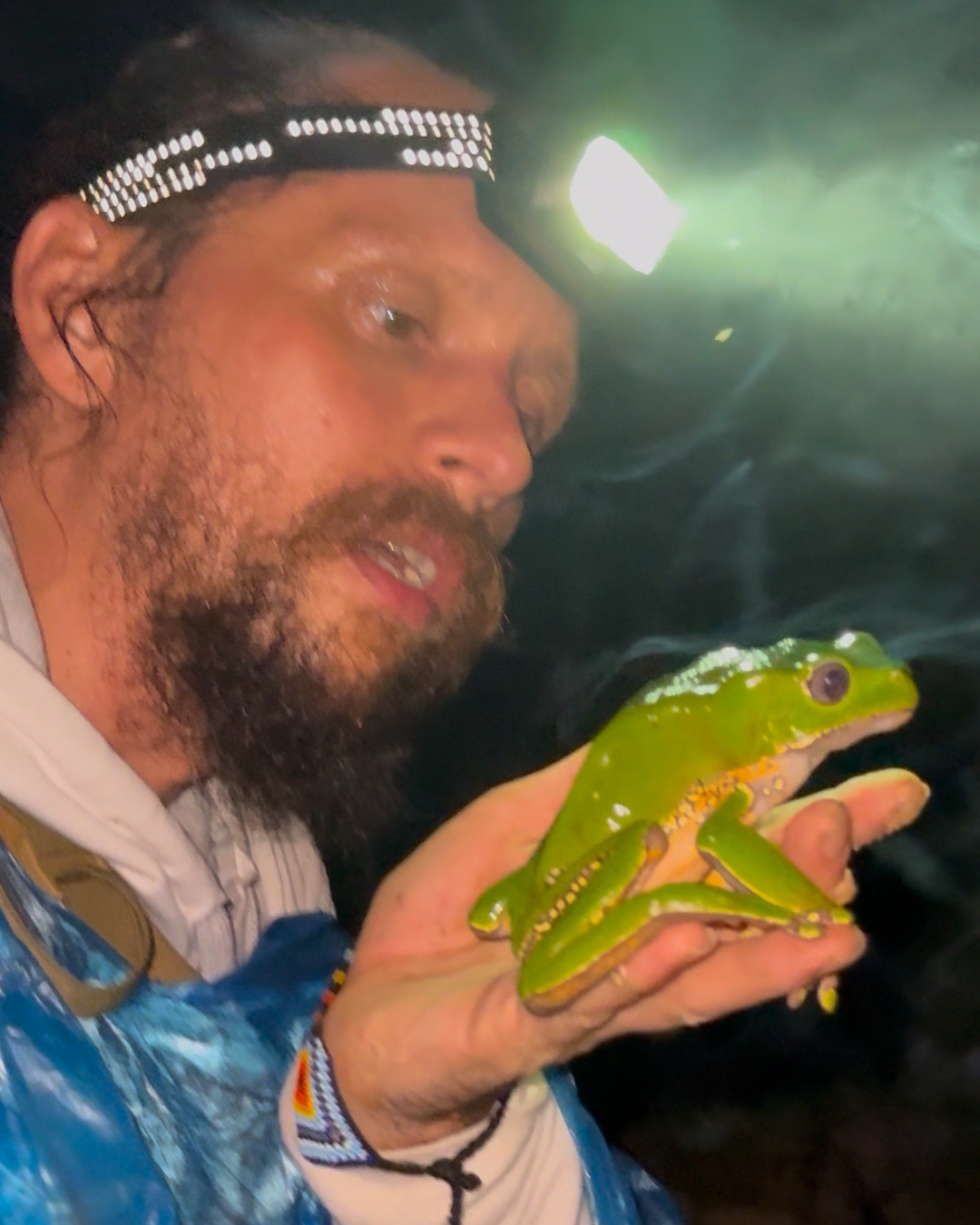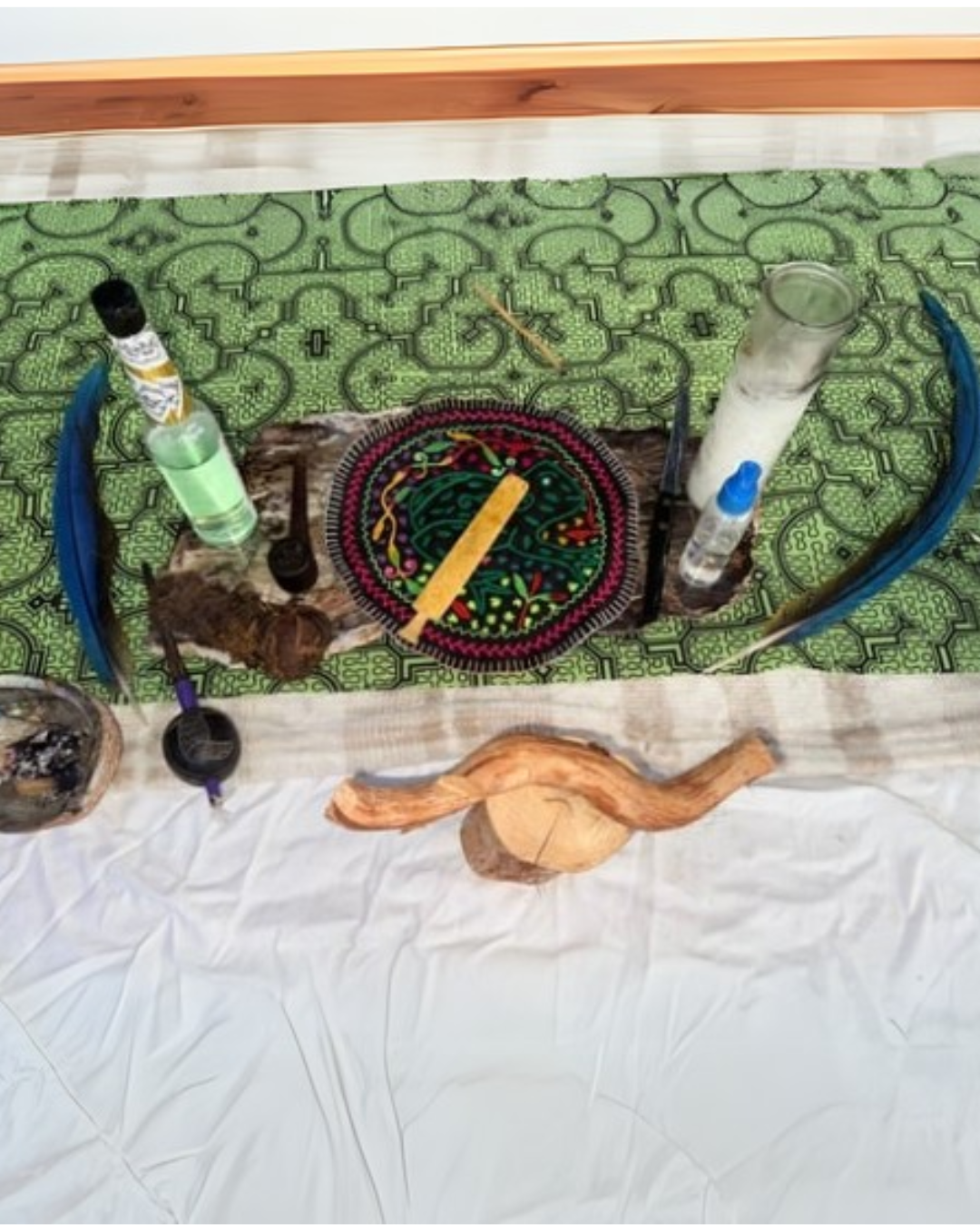



What is Kambo?
Kambo is a traditional healing practice that involves using the secretion of the Phyllomedusa bicolor frog, also known as the giant monkey frog, native to the Amazon rainforest. The secretion is applied to small burns on the skin, allowing it to be absorbed into the lymphatic system. The practice originated among indigenous tribes in the Amazon basin, who have used Kambo for centuries to cleanse the body, increase endurance, and bring spiritual clarity.
Resetting full life force energy back into the body!
Collapsible content
How Kambo Works?
During a Kambo session, a trained practitioner makes small, superficial burns on the skin (often on the arm or leg) to create a pathway for the secretion to enter the body. The secretion is then applied to these points. Once it enters the body, it induces a variety of effects, including:
Kambo is a potent yet natural detoxification ally that supports deep cleansing on a physical and energetic level. During a Kambo session, a trained practitioner makes small, superficial burns on the skin (often on the arm or leg) to create a pathway for the secretion to enter the body. Its effects are purifying—some experience an increase in heart rate or purging, while others simply feel heat or movement within the body. These responses help stimulate the lymphatic system, allowing it to drain built-up seed oils, toxins, mold, Lyme-related imbalances, and especially excess oils that block natural flow and your heart. As the system clears, the blood becomes more purified, and life force energy can move freely again. With proper guidance in a safe, supportive space, Kambo can be a powerful tool for renewal—restoring clarity, vitality, and a profound sense of connection to the body and spirit.
Peptides in Kambo
The secretion of the Kambo frog contains various bioactive peptides that interact with the human body:
Phyllocaerulein: Helps with digestion and has pain-relieving properties.
Dermorphin and deltorphin: These are potent opioid peptides that provide pain relief.
Adenoregulin: Interacts with adenosine receptors, impacting energy levels, mood, and sleep.
Phyllokinin and phyllomedusin: Contribute to the dilation of blood vessels and smooth muscle relaxation, potentially aiding in the purging effect.
Reported Benefits of Kambo
Detoxification: Kambo is traditionally used to clear physical toxins, and many people report feeling cleansed and rejuvenated after the process.
Increased Immunity: Some studies suggest Kambo may boost the immune system, helping the body fight off illness more effectively.
Pain Relief: Due to its natural opioid-like compounds, Kambo may provide relief from physical pain, although this effect varies by individual.
Mental Clarity and Emotional Balance: Many people report feeling a heightened sense of calm, clarity, and emotional release following a Kambo session.
Energy Boost: Kambo is sometimes used to increase physical energy and endurance, as well as to reduce fatigue and improve focus.
Risks and Considerations
Kambo is a potent yet natural detoxification ally that supports deep cleansing on a physical and energetic level. Its effects are purifying—some experience an increase in heart rate or gentle purging, while others simply feel heat or movement within the body. These responses help stimulate the lymphatic system, allowing it to drain built-up toxins, mold, Lyme-related imbalances, and even excess oils that may block natural flow. As the system clears, the blood becomes more purified, and life force energy can move freely again. With proper guidance in a safe, supportive space, Kambo can be a powerful tool for renewal—restoring clarity, vitality, and a profound sense of connection to the body and spirit.
Kambo vs. Other Healing Modalities
Ayahuasca and Psilocybin: Unlike these plant medicines, Kambo is non-psychoactive; it doesn't cause hallucinations or altered states of consciousness.
Detoxifying Modalities: While other detox methods (like fasting or juice cleanses) aim to purify the body gradually, Kambo induces a rapid, intense purge.
Why People Use Kambo
People are often drawn to Kambo for its reputation as a "warrior medicine," seeking its purgative and balancing effects to clear out stagnant energy, overcome obstacles, or enhance personal resilience. Others use it for physical ailments, chronic pain, or to support healing from trauma and emotional blocks.
Does it leave marks?
2 months after the ceremony. You can barley notice. Equivalent of a sunburn.

What comes next after scheduling?
Once you book your appointment, you'll receive a confirmation email with our address and a link to fill out the required release form. You'll also get a personal phone call from our team to connect and answer any questions before your session.
***Preparing for a Kambo Ceremony***
An appropriate diet is essential for maximizing the benefits and ensuring a safe, smooth experience. Here’s a typical guide for what to follow before your ceremony:
1. 3 to 7 Days Before Ceremony• Avoid alcohol, caffeine, and recreational drugs: These substances can interfere with Kambo’s cleansing effects and may make the ceremony more intense.
• Limit processed and fatty foods: Stick to whole foods, such as fruits, vegetables, whole grains, and lean proteins. Avoid greasy, fried, or heavily processed foods, as they can add stress to your digestive and lymphatic systems.
• Cut out animal products, if possible: Some people follow a plant-based diet leading up to Kambo, as animal proteins can be harder to digest and may interfere with detoxification.
• Reduce salt and sugar intake: Excessive salt or sugar can disrupt the body’s natural balance, so minimizing them can support the body’s preparation for cleansing.
2. Day of Ceremony• Fast or eat very lightly: Fasting for at least 12-16 hours is often recommended before the ceremony, so avoid heavy meals the night before. An empty stomach helps reduce the chance of nausea and allows the Kambo to work more efficiently.
• Hydrate properly: Drink plenty of water the day before and a half gallon amount the morning of (but not right before the ceremony). Excessive water can dilute Kambo’s effects or make you feel overly full during the session.
3. Mental and Emotional Preparation• Set your intentions: Take time to reflect on what you hope to gain from the Kambo experience. Journaling or meditating can help you clarify your intentions.
• Avoid intense emotional or physical stress: Keep the days leading up to the ceremony calm and peaceful, if possible, to create a balanced mindset for the experience.
Following this preparatory diet helps your body be receptive to Kambo’s effects, supports a smoother process, and may enhance the overall experience. Always consult your practitioner for any specific instructions, as each person’s preparation needs may vary.
4. How the session Flow over a span of 10 days, you complete three sessions, each one scheduled every third day.
Testimonials
"These statements have not been evaluated by the Food and Drug Administration. This product is not intended to diagnose, treat, or prevent any disease"




